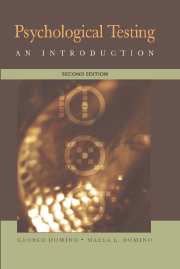Book contents
- Frontmatter
- Contents
- Preface
- Acknowledgments
- PART ONE BASIC ISSUES
- 1 The Nature of Tests
- 2 Test Construction, Administration, and Interpretation
- 3 Reliability and Validity
- PART TWO DIMENSIONS OF TESTING
- PART THREE APPLICATIONS OF TESTING
- PART FOUR THE SETTINGS
- PART FIVE CHALLENGES TO TESTING
- Appendix: Table to Translate Difficulty Level of a Test Item into a z Score
- References
- Test Index
- Index of Acronyms
- Subject Index
- References
3 - Reliability and Validity
from PART ONE - BASIC ISSUES
Published online by Cambridge University Press: 05 June 2012
- Frontmatter
- Contents
- Preface
- Acknowledgments
- PART ONE BASIC ISSUES
- 1 The Nature of Tests
- 2 Test Construction, Administration, and Interpretation
- 3 Reliability and Validity
- PART TWO DIMENSIONS OF TESTING
- PART THREE APPLICATIONS OF TESTING
- PART FOUR THE SETTINGS
- PART FIVE CHALLENGES TO TESTING
- Appendix: Table to Translate Difficulty Level of a Test Item into a z Score
- References
- Test Index
- Index of Acronyms
- Subject Index
- References
Summary
AIM This chapter introduces the concepts of reliability and of validity as the two basic properties that every measuring instrument must have. These two properties are defined and the various subtypes of each discussed. The major focus is on a logical understanding of the concepts, as well as an applied understanding through the use of various statistical approaches.
INTRODUCTION
Every measuring instrument, whether it is a yard-stick or an inventory of depression, must have two properties: the instrument must yield consistent measurement, i.e., must be reliable, and the instrument must in fact measure the variable it is said to measure, i.e., must be valid. These two properties, reliability and validity, are the focus of this chapter.
RELIABILITY
Imagine that you have a rich uncle who has just returned from a cruise to an exotic country, and he has brought you as a souvenir a small ruler – not a pygmy king, but a piece of wood with markings on it. Before you decide that your imaginary uncle is a tightwad, I should tell you that the ruler is made of an extremely rare wood with an interesting property – the wood shrinks and expands randomly – not according to humidity or temperature or day of the week, but randomly. If such a ruler existed it would be an interesting conversation piece, but as a measuring instrument it would be a miserable failure.
- Type
- Chapter
- Information
- Psychological TestingAn Introduction, pp. 42 - 66Publisher: Cambridge University PressPrint publication year: 2006



